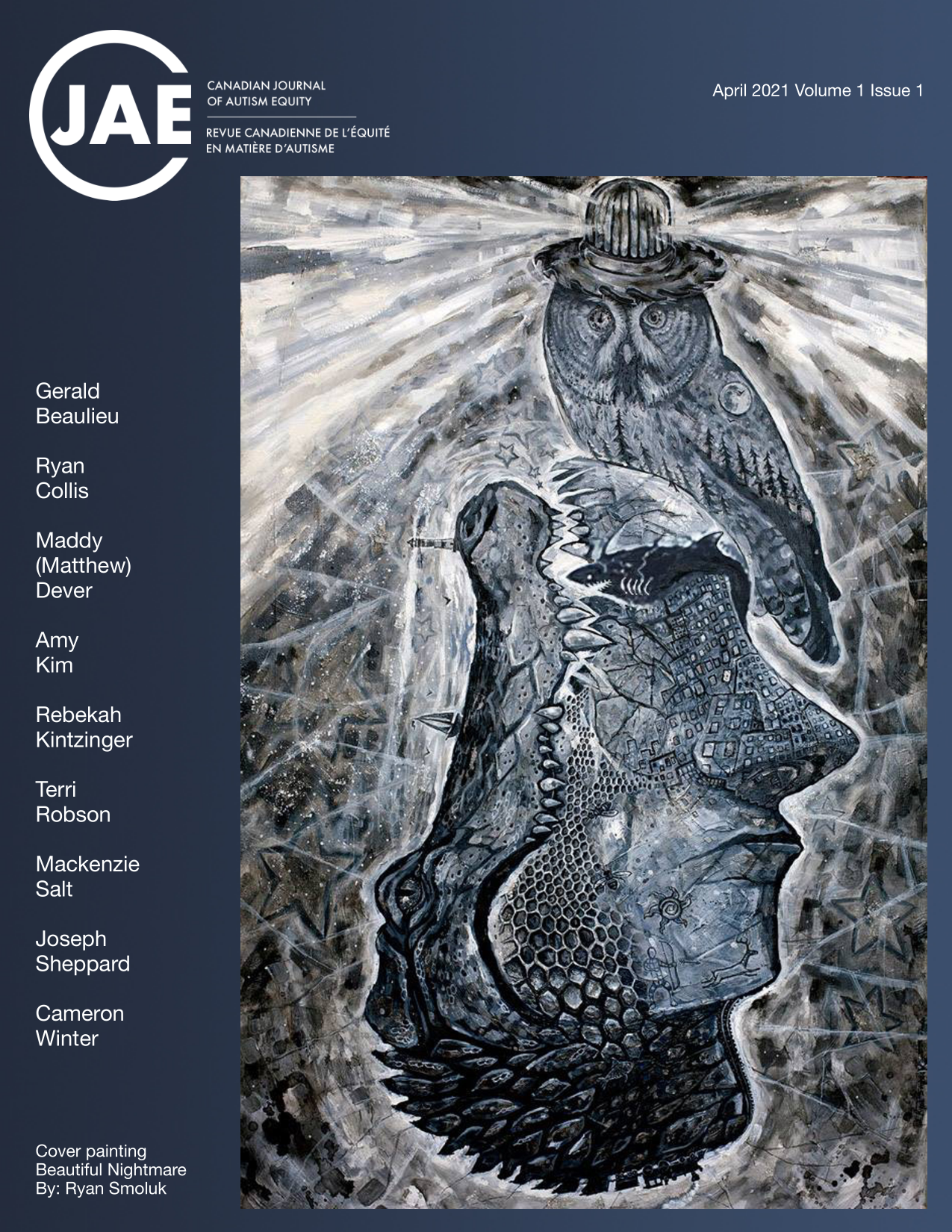Moving From Autism Awareness to Acceptance - Language of Inclusion
DOI:
https://doi.org/10.15173/cjae.v1i1.4985Keywords:
Awareness, Acceptance, Language, Stigma, InclusionAbstract
For the last 50 years, April has been celebrated as Autism Awareness Month, and media campaigns and fundraisers have occurred alongside, trying to raise “awareness” of the difficulties and challenges associated with having a family member diagnosed with autism. The stigma that “awareness” continues to foster creates real barriers for Autistics to be seen as more than a stereotype. Many Autistics believe strongly that we need to move past a time of awareness and move to a time of autism “acceptance”. Accepting who we are, and our different ways of thinking, acting, and presenting ourselves to the world. This video and associated transcript will look at how we can move from autism awareness to autism acceptance through a change in the language we use. Moving from words and thoughts that cause exclusion and segregation to words that promote inclusion and accommodation. Changing our language changes the way we think, changing the way we think, changes the way we act, and our actions can bring about change that will allow Autistics to thrive. If we change how we talk about autism in policy, in programs, in research and in media, we will change how autism is conceived of and start to see the barriers around Autistics come down.
References
Alsehemi, M. A., Abousaadeh, M. M., Sairafi, R. A., & Jan, M. M. (2017). Public awareness of autism spectrum disorder. Neurosciences, 22(3), 213-215. https://doi.org/10.17712/nsj.2017.3.20160525
Autism Society. (n.d.). Autism Acceptance Month. Autism Society. Retrieved June 24, 2021, from https://www.autism-society.org/get-involved/national-autism-awareness-month/
Botha, M., Hanlon, J., & Williams, G. L. (2021). Does Language Matter? Identity-First Versus Person-First Language Use in Autism Research: A Response to Vivanti. Journal of Autism and Developmental Disorders. https://doi.org/10.1007/s10803-020-04858-w
Bottema-Beutel, K., Kapp, S. K., Lester, J. N., Sasson, N. J., & Hand, B. N. (2021). Avoiding Ableist Language: Suggestions for Autism Researchers. Autism in Adulthood, 3(1). https://doi.org/10.1089/aut.2020.0014/aut.2020.0014
Canadian Autism Spectrum Disorder Alliance. (2021, April 6). #AutismAcceptanceMonth with CASDA. CASDA. Retrieved July 3, 2021, from https://www.casda.ca/world-autism-month-2021/
Evans, B. (2013). How autism became autism - The radical transformation of a central concept of child development in Britain. History of the Human Sciences, 26(3), 3-31. https://doi.org/10.1177/0952695113484320/10.1177/0952695113484320
Kapp, S. (2019). How social deficit models exacerbate the medical model: Autism as case in point. Autism Policy & Practice, 2, 3-28. Retrieved from https://researchportal.port.ac.uk/portal/files/16090863/How_social_deficit_models.pdf
Lilienfeld, S. O., Sauvigne, K. C., Lynn, S. J., Cautlin, R. J., Lautzman, R. D., & Waldman, I. D. (2015). Fifty psychological and psychiatric terms to avoid: a list of inaccurate, misleading, misused, ambiguous, and logically confused words and phrases. Frontiers in Psychology, 6, 1100. https://doi.org/10.3389/fpsyg.2015.01100
National Disability Arts Collection and Archive. (n.d.). Fundamental Principles of Disability. NDACA. Retrieved July 3, 2021, from
https://the-ndaca.org/resources/audio-described-gallery/fundamental-principles-of-disability/
Organization for Autism Research. (2020, September 30). 1,000 PEOPLE SURVEYED, SURVEY SAYS…. Organization for Autism Research. Retrieved July 3, 2021, from https://researchautism.org/1000-people-surveyed-survey-says/
Sasson, N. J., Faso, D. J., Nugent, J., Lovell, S., Kennedy, D. P., & Grossman, R. B. (2017). Neurotypical Peers are Less Willing to Interact with Those with Autism based on Thin Slice Judgments. Scientific Reports, 7(1), 1-10. https://doi.org/10.1038/srep40700
United Nations. (n.d.). World Autism Awareness Day 2 April. World Autism Awareness Day 2 April. Retrieved June 24, 2021, from https://www.un.org/en/observances/autism-day/background
Downloads
Published
How to Cite
Issue
Section
License
Copyright (c) 2021 Maddy

This work is licensed under a Creative Commons Attribution-NonCommercial-ShareAlike 4.0 International License.
Authors retain copyright and grant the journal the right of first publication with the work simultaneously licensed under a Creative Commons Attribution License that allows others to share the work with an acknowledgement of the work's authorship and initial publication in this journal.
Authors are able to enter into separate, additional contractual arrangements for the non-exclusive distribution of the journal's published version of the work (e.g., post it to an institutional repository or publish it in a book), with an acknowledgement of its initial publication in this journal.
CJAE accepts articles that have not been published in any other journals/proceedings, unless copyright permission is assured, and have not been submitted for consideration to any other journals/proceedings at the time of submitting to the Canadian Journal of Autism Equity for consideration. While a paper is under consideration by CJAE, you agree not to submit the work to other journals/proceedings until review by CJAE is completed and a decision has been rendered.



